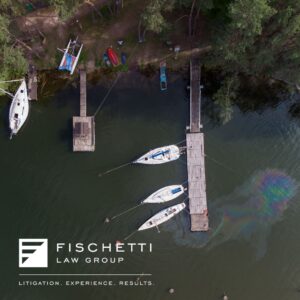Boat Accident Lawyer Coral Springs | Premier Boat Accident Lawyer
Fischetti Law Group is your Coral Springs’ Trusted Advocate in Boat Accident Claims Navigating the aftermath of a boat accident can be as challenging as navigating stormy seas. At the Fischetti Law Group, we specialize in providing expert legal guidance and compassionate support to individuals and families affected by boating accidents in Coral Springs, Florida. With our deep understanding of maritime law and a commitment to your well-being, we’re here to steer you toward the compensation and justice you deserve.
Boating is a popular pastime in Coral Springs, Florida, offering both residents and visitors a chance to enjoy the beautiful waterways of the Sunshine State. However, the fun can quickly turn sour in the event of a boat accident. If you find yourself in this unfortunate situation, knowing how to navigate a boat accident claim is crucial. This blog post will guide you through the process, from the immediate aftermath of the accident to the resolution of your claim.
Step 1: Ensure Safety and Seek Medical Attention
Immediate Actions: The first priority in any boating accident is to ensure the safety of all parties involved. If anyone is injured, call 911 immediately.
Medical Treatment: Even if injuries seem minor, it’s important to get a medical evaluation. Some injuries, especially those related to water and impact, may not be immediately apparent.
 Step 2: Report the Accident
Step 2: Report the Accident
Legal Requirements: In Florida, you must report a boating accident to the Florida Fish and Wildlife Conservation Commission, the local sheriff, or the police department.
Reporting Timeframe: This should be done within 48 hours if there’s a death, disappearance, or significant injury, or within 10 days for other accidents.
Document reporting involves presenting information, data, or findings from a particular document in a structured and easily understandable format. This process can range from summarizing a lengthy report to presenting critical findings in a meeting. The key lies in extracting the most relevant information and presenting it in a coherent and concise manner. For professionals, this might involve reporting on a business document, while for academics, it could mean analyzing a scholarly article or research paper.
Step 3: Document Everything
When involved in a boat accident in Coral Springs, it is important to gather evidence. Collecting evidence is one of the most effective ways of bolstering your case against the insurance company. Gathering Evidence means taking pictures and video of the accident scene, the damage to your boat, and any injuries sustained. Make sure your boat accident evidence shots are clear and have good lighting. Next is Witness Statements: Collect contact information and statements from any witnesses. Finally Official Report: Obtain a copy of the official accident report, as it will be crucial for your insurance claim.
Step 4: Notify Your Insurance Company
Once you’ve ensured everyone’s safety, contacted the authorities if necessary, and gathered all relevant information, you should notify your insurance company as soon as possible. Most insurance policies have specific time limits within which you must report accidents. Failing to report promptly could result in a denied claim.
When reporting the accident to your insurance company, be honest and provide accurate information. Describe the accident, how it happened, and the extent of the damages. If there were witnesses, provide their contact information as well. Your insurance company will guide you through the claims process. This typically involves submitting a claim form and any supporting documentation they require. They may also arrange for an adjuster to assess the damage and determine the value of the claim.
Step 5: Understand Your Coverage
Take the time to review your boat insurance policy carefully. Understand what it covers, including the types of accidents and damages that are eligible for a claim. Knowing your policy’s terms and conditions will help you navigate the claims process more effectively.
Step 6: Consult a Boat Accident Attorney
A local attorney with experience in boat accident claims can be invaluable. They can help navigate complex

Step 7: Be Cautious with Early Settlement Offers
Insurer’s Offer: Insurance companies may offer a quick settlement, but these initial offers are often lower than what you may be entitled to.
Legal Advice: Before accepting any offer, consult with your attorney to ensure it’s fair and covers all your expenses and damages.
Common Boating Accidents in Coral Springs
TESTIMONIALS
What People Say
Mike helped me so much in my boat accident claim. Weather you are located in coral springs or south Florida – this is your attorney! Best experience I’ve had through this otherwise stressful process! THANK YOU!
Best Coral Springs boat lawyer around. Truly a professional and made the process so simple. The staff were great as well!


